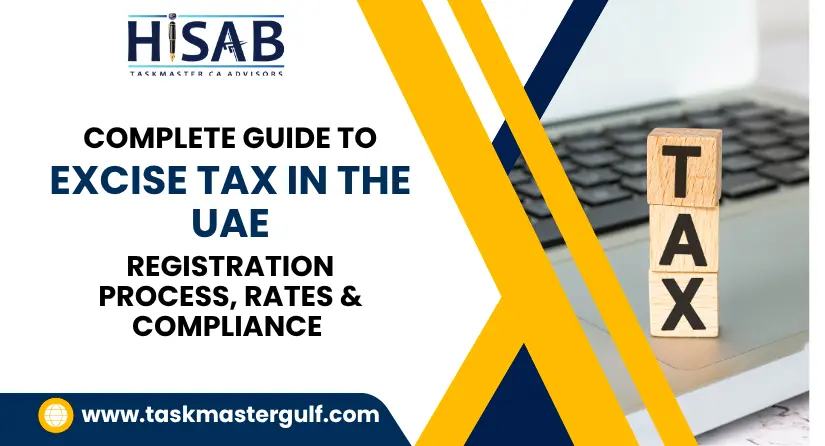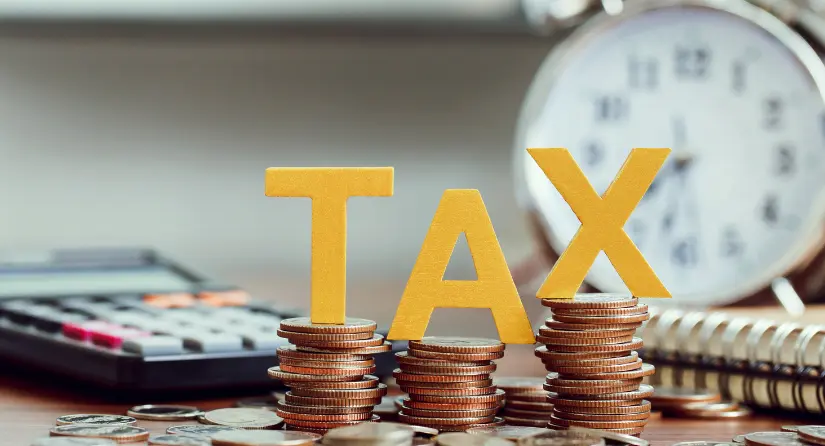Mon to Fri: 9am–6pm, Sat: 9am to 2pm, Sun: Closed

Complete Guide to Excise Tax in the UAE: Registration Process, Rates & Compliance
The excise tax in the UAE was introduced in 2017 and is imposed on specific goods. The primary focus behind introducing it was to reduce the consumption of products that are harmful to human health and the environment. By implementing this tax on products like tobacco and energy drinks, the Emirati government aims to promote better consumer habits.
Another reason for introducing the UAE excise tax was to generate additional revenue for public services. Whether you are involved in importing, producing, or trading any excise goods, you must understand how this tax works in the Emirates. Keep reading to know everything from registration and rates to compliance obligations and penalties related to this tax. Complete knowledge about excise tax will help you maintain compliance with the FTA.
- What is the Excise Tax in the UAE?
- Who Must Register for Excise Tax in the UAE?
- Who Doesn’t Need to Register for UAE Excise Tax?
- What are Excisable Goods & Tax Rates in UAE?
- Excise Tax UAE Registration Process
- Documents Needed for UAE Excise Tax Registration
- Excise Tax UAE: Compliance Obligations
- UAE Excise Tax: Penalties for Non-Compliance
What is the Excise Tax in the UAE?
As we discussed above, the excise tax UAE is an indirect tax imposed on goods that are harmful to human health and the environment. This was introduced by the FTA on goods, like cigarettes and sugary drinks. This tax is applied at the point of import or production. Typically, it is charged at the rate of 50% and 100%.
Unlike VAT, which is charged at every stage of the supply chain, the excise tax in the UAE is applied only once. Those dealing with excise goods in any way, like importing or production, must register for excise tax with the Emirates’ tax authority. Moreover, they must file returns and pay the tax timely to avoid penalties due to non-compliance.
Who Must Register for Excise Tax in the UAE?
Business owners in the UAE involved in any activity related to specific excise goods must register with the FTA for excise tax. Registration with the Emirates’ tax authority is necessary for the following activities involving excisable products:
- Manufacturers: Any business that produces excisable goods within the UAE.
- Importers: Businesses involved in bringing excisable goods into the country.
- Stockpilers: Any business holding a large inventory or quantity of untaxed excisable goods for commercial use. These can be warehouse owners, traders, and retailers.
- Warehouse Keepers: These operate designated warehouses where excisable goods are stored in the UAE.

Who Doesn’t Need to Register for UAE Excise Tax?
Businesses that do not import excisable goods frequently may get an exemption from registration. However, they still need to pay the required tax to the authority. The end consumers using these specific goods are not taxed. Additionally, logistics service providers offering services for businesses but are not involved in owning the excisable goods also don’t need to register. Those retailers who sell excisable goods that are already charged with required taxes don’t need to register.
What are Excisable Goods & Tax Rates in UAE?
Any item that is considered harmful for human health or the environment is charged with UAE excise tax. Here is the specific list of goods with rates that are declared excisable by the FTA:
- Tobacco & Tobacco Products: These are taxed at 100%.
- Energy Drinks: These are taxed at 100%.
- Carbonated Drinks: These are taxed at 50%.
- Electronic Smoking Devices & Tools: These are taxed at 100%.
- Liquids Used in Electronic Smoking Devices: These are taxed at 100%.
- Sweetened Drinks: These are taxed at 50% on beverages containing sugar or other sweeteners.
In January 2026, a major change will be implemented by the FTA in the current excise tax rate system for sweetened drinks. From January 1, 2026, these drinks will be charged based on the sugar content. Drinks with high-sugar content will face higher tax rates.
Excise Tax UAE Registration Process

Businesses that meet the eligibility criteria to register for Excise Tax UAE must register online through the FTA’s EmaraTax portal.
- You simply need to visit the portal and provide the necessary details about your business and its activities.
- You also need to upload some documents, like trade licenses and customs information, that you must prepare in advance.
- After completing the online form with business and good details, you need to submit your application.
- The tax authority will then review your application and decide whether to issue a TRN number or share with you the incomplete requirements.
Excise tax registration in UAE is a one-time process. This means you don’t need to apply for renewal, as your registration remains valid as long as you keep dealing with excisable goods in the country.
Documents Needed for UAE Excise Tax Registration

Before starting the registration process for the UAE excise tax, businesses must prepare the following necessary documents:
- Trade License: A valid copy of the commercial or trade license for your business.
- AOA or Partnership Agreement: The official documents for your company or partnership.
- Certificate of Incorporation: If your business is a corporation, you will need this certificate.
- Authorized Signatory Details: Information for the individual authorized to act on behalf of the company, along with proof of their authorization.
- Owner and Manager Identification: Emirates IDs and passport copies for the owner and manager of the business.
- Customs Registration Number: You might need to provide your customs registration details.
- Bank Account Information: Your bank account details.
- Manufacturers need to provide details of the goods they produce.
- Importers need to submit relevant customs declarations or import records.
- Warehouse keepers need to provide documents related to their storage facilities for excise goods.
Excise Tax UAE: Compliance Obligations
Not only is registering for excise tax in the UAE enough. Businesses also need to continue following some specific obligations related to this tax.
1. Registration
Without registration with the FTA, no business in the UAE can be involved in any activity linked with excise goods. They need an excise TRN to produce, import, and store goods on which this tax is charged in the country.
2. Record-Keeping
Businesses need to maintain accurate and organized records of all excise goods transactions for at least five years. From sales to purchases and inventory, any data related to excisable goods must be accurately reported, and the tax calculated. In case of an audit, these are usually asked to be submitted by the FTA.
3. Reporting and Filing
You must regularly file excise returns with the FTA. This can be done on a monthly or quarterly basis. The report covers all details about the taxable operations done by your business. Timely submission of reports helps you avoid hefty penalties.
4. Payment of Tax
You must make sure you make timely and accurate payment of your excise tax liabilities to the FTA. Moreover, the FTA has the authority to ensure that a business maintains compliance. You must maintain the required records, as they are inspected during the audits.
5. Product-Specific Regulations
You must comply with all rules related to the specific goods they handle, like rules related to labeling, product specification, and distribution limitations. Misclassifying excise goods or providing false information can make your business face severe legal issues.
UAE Excise Tax: Penalties for Non-Compliance

Businesses must maintain compliance with the required obligations related to the excise tax in the UAE. Those who fail to comply with obligatory regulations face penalties and legal issues from the FTA.
1. Administrative Penalties
For issues like late registration, late filing, or failing to keep proper records, businesses need to pay hefty fines. For the first offense of late filing a tax return, the fine is AED 1,000. However, for repeated offenses, it is AED 2,000. Failing to provide the required price lists and ensuring tax registration might result in fines of AED 5,000 and AED 10,000, respectively.
2. Interest charges
Penalties and interest can be charged for the late payment or non-payment of excise tax.
3. Legal Issues
Businesses involved with serious violations, like intentional tax evasion, can face legal problems.
4. Reputational damage
Failing to follow the required obligations of excise tax in the UAE can badly harm your company’s public image and reputation.
Stay Compliant with UAE Excise Tax with Taskmaster
Now you know that registration for excise tax in the UAE is mandatory for all businesses involved in any activity related to specific goods that are classified as harmful by the FTA. This was introduced by the tax authority to reduce the dependence on the country’s oil sector. With proper registration and timely submission of tax returns, you can maintain your business’s compliance and protect it from penalties and legal issues.
With HISAB Taskmaster CA Advisors, your business can always stay updated with the latest excise tax rules. We make sure our clients are always protected from penalties and legal issues linked with this tax charged on excisable goods. Our team takes care of tax file returns, reporting requirements, and other tasks. Whether you need our support for filing or ongoing tax compliance, we can assist with anything. With us, you don’t need to worry about maintaining compliance with the changing tax rules. Connect with our experts to make sure your business is compliant with every FTA guideline.
Also Read – Top 10 Private Equity Consulting Firms in Dubai, UAE



